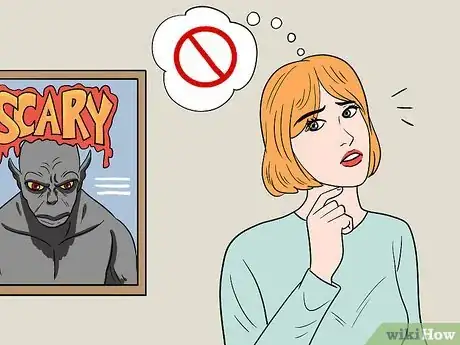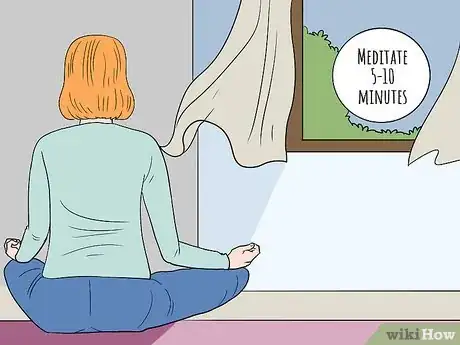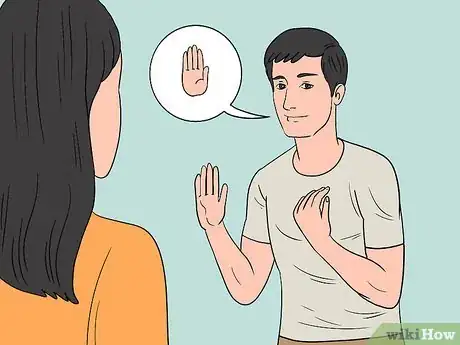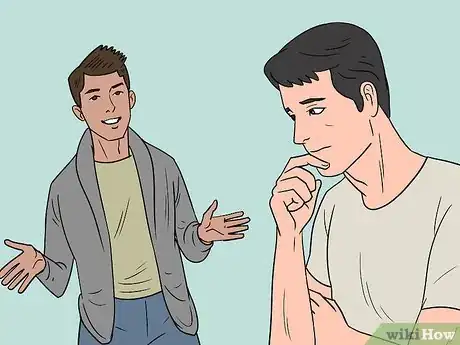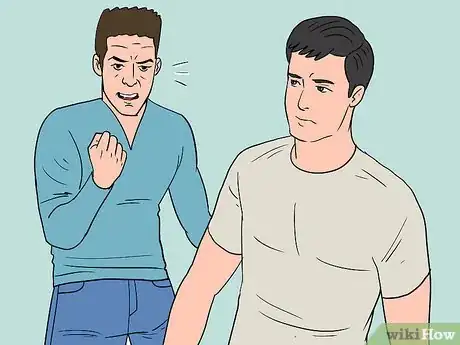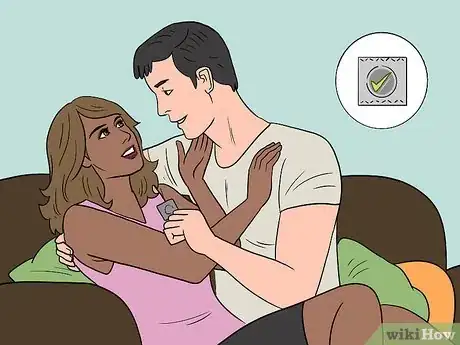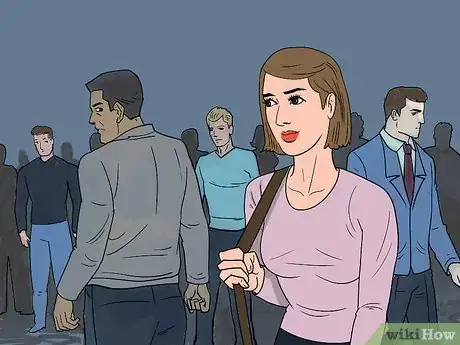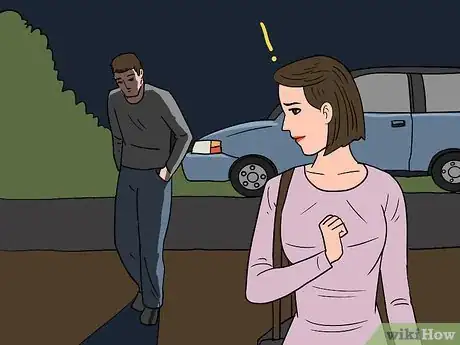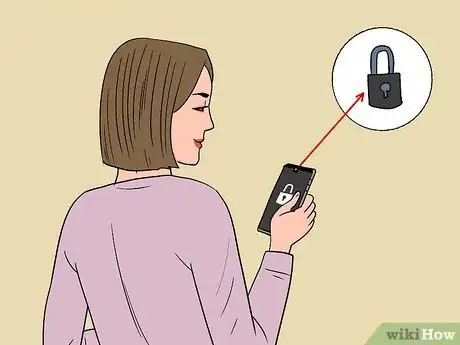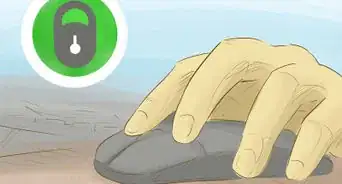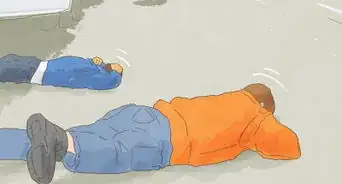This article was co-authored by Asher Smiley and by wikiHow staff writer, Danielle Blinka, MA, MPA. Asher Smiley is the Owner and Lead Instructor at Krav Maga Revolution in Petaluma, California. Asher has earned a Tier 1 Instructor Certification in the American Krav Maga system. In 2017, he trained with the International Kapap Federation Combat Krav Maga International, completing their 7 day tactical seminar and the 8 day CKMI instructor course.
There are 14 references cited in this article, which can be found at the bottom of the page.
This article has been viewed 180,049 times.
Keeping yourself safe is really important, so learning how to protect yourself is a great idea. There are a lot of potential dangers out there in the world, but you can avoid them if you know how. First, take care of your emotional needs so you’re mentally strong. Additionally, make sure that you’re protecting yourself in relationships and avoiding potential dangers.
Steps
Taking Care of Your Emotional Needs
-
1Be assertive so your needs get met. Being assertive means standing up for yourself without being aggressive toward the other person. Be honest with people about how you’re feeling and what you need from them. When you express your needs, use I-statements so that you aren’t blaming the other person. Additionally, stay calm and neutral when interacting with people.[1]
- For instance, you might say, “I need to go home right now,” “I want you to help me with the chores,” or “I feel upset over what you did.”
- If you don’t want to do something, be honest and tell the person, “No.”
-
2Create a support network of friends and family. Spending time with the people you care about helps you enjoy life. Additionally, it might help you deal with your problems because it gives you a safety net. Identify people in your life who are reliable and trustworthy. Invite these people to spend time with you, and communicate with them often through talking and text.[2]
- Your support network can be there for you when you have problems. For instance, you might text your friend if you’re feeling sad or talk to your parent if you’re having trouble at school.
Advertisement -
3Manage your stress so that you don’t get overwhelmed. Stress is a normal part of life, but it can harm you emotionally and physically if you have a lot of stress. Try out different ways to relieve stress, then incorporate your favorite activities into your daily routine. Here are some coping strategies for managing stress:[3]
- Vent to a friend.
- Play with your pet.
- Color in an adult coloring book.
- Go for a walk.
- Use aromatherapy.
- Take a warm bath.
- Read a book.
- Do something creative.
-
4Include fun activities in your week so you feel happy. Life is full of ups and downs, and negative feelings can weigh you down. To help yourself stay positive, do something fun a few times a week to boost your mood. This might include a hobby, an activity with friends, or simple pleasures, like watching your favorite show.[4]
- As an example, you might go to the park, get coffee with a friend, watch your favorite show, draw in your sketchbook, bake cookies, soak in a hot bath, or go bowling with friends on Saturday.
-
5Avoid negative information and images that might upset you. Violent or upsetting images, stories, or media can harm your emotional wellbeing. Be really cautious about what you spend your time thinking about. Stay away from images, TV shows, movies, and stories that trigger fearful, angry, or depressed thoughts.[5]
- For example, don’t watch horror movies if they make you really afraid.
-
6Learn how to ground yourself when you’re feeling upset. It’s normal to experience painful emotions like sadness, anger, or jealousy. Don’t try to avoid these negative feelings because that can make things worse. Instead, use a grounding strategy to help you calm down. Here are some ways you might ground yourself:[6]
Being Safe in Relationships
-
1Set clear boundaries in your relationships to protect your emotions. Boundaries are expectations you have for your friends, family, or romantic partner. They help the other person understand what you won’t tolerate in your relationship. Talk to people about what you’re not okay with them doing and what will happen if they do it.[8]
- For instance, you might tell your best friend, “If you share my secrets with anyone, I won't be able to trust you.” Similarly, you might tell your sister, “It’s not okay for you to read my journal. If you spy on me, I’m going to tell mom.”
-
2Build trust before you share secrets with someone. Typically, you only share your most intimate secrets with your closest friends or loved ones. Don’t reveal your personal information to anyone you don’t know really well. Additionally, take your time to get to know someone before you open up. Make sure that they’re sharing the same type of personal information with you so you have mutual trust.[9]
- It’s unfair, but some people aren’t trustworthy. Be really careful about who you talk to about your secrets.
-
3Stay away from people who try to hurt your feelings. It’s super painful when someone calls you a name or insults you. However, try to remember that this says more about them than it does about you. Don’t define yourself by what other people say. Instead, distance yourself from people who are mean.[10]
- Keep in mind that people are often mean because they feel bad about themselves. Don't let what they say get to you. Walk away and spend time with someone who cares about you.
Tip: If a person is bullying you, tell someone who can help you immediately. Bullying is never your fault, and the person needs to stop immediately.
-
4Practice safe sex if you’re sexually active. First, wait until you feel emotionally and physically ready to have sex before being intimate. When you feel ready, talk to your partner about each of your sexual histories. Then, make sure that you use protection, like a condom.[11]
- You might say to your partner, “Before we have sex, I want to talk about our sexual history. I’ve never had sex before. What about you?”
- Condoms protect you against both pregnancy and sexually-transmitted diseases (STDs). They are about 98% effective when used correctly.[12]
- If you’re a teen, it’s best to talk to a parent or trusted adult before you have sex. They’ll help you make safe decisions to protect your health and your emotional wellbeing.
Avoiding Dangers
-
1Be aware of your environment so you can avoid potential threats. Try not to worry when you’re out in public because you’re probably not in danger. However, stay alert and observe your surroundings so you’re less vulnerable. Keep your phone put away so you aren’t distracted, and look around you to see if anyone is nearby.[13]
- A potential attacker is less likely to pick you if you seem alert and aware.
- If you’re alone, walk at a quick pace so you can get to your destination faster.
-
2Travel in a group to help you stay safe. You’ve probably heard the phrase “Safety in numbers," and it’s true. You’re usually in less danger if you’re with other people. When possible, stick close to a buddy or a group of people when you’re out in public.[14]
- When you’re out with family or friends, always ask someone to go with you if you’re walking away from the group.
- If you’re alone but there are people nearby, stick close to the pack unless they’re the ones making you feel threatened.
Variation: If you have a dog, take it with you when you’re going out alone, especially if you jog or walk for fitness. The dog might scare off would-be attackers.
-
3Listen to your gut if something feels wrong. You’ve probably had moments where your inner voice told you to be cautious, and that’s your gut talking to you. While your gut might sometimes be wrong about things, it’s important to listen to it when your safety is involved. If something feels wrong to you, take the warning and move to a safer location. Additionally, call someone you trust for help if you can.[15]
- For instance, let’s say you’re walking across a parking lot and see someone who looks threatening. Keep your distance from them and move as quickly as possible to the building, a car, or a hiding spot.
- Keep in mind that you’re probably safe. However, it’s better to be safe than sorry, so listen to your inner voice if it’s telling you to be cautious.
-
4Make safe decisions while you’re having fun. You don’t have to stop having fun to keep yourself safe. Just be careful so that the fun times continue. Here are some ways to keep yourself safe when you’re out having fun:[16]
- Tell someone where you’re going.
- Stay near your friends.
- Avoid alcohol if you’re underage.
- Don’t accept a drink from a stranger.
- Avoid leaving your drink unattended.
- Stop drinking if you start to feel drunk.
-
5Don’t accept a ride from someone you don’t know. It’s inconvenient and sometimes scary to be without a ride, but it’s too risky to get in the car with someone you don’t know. They might seem really nice, but they could be trying to trick you. If someone offers you a ride, tell them “No” in a kind but firm voice.[17]
- Say, “No, thanks. I don’t need a ride.”
Tip: It’s okay to use ridesharing services as long as you go through the app to get your ride. Make sure that the person who arrives to pick you up matches the profile of the driver you’re expecting.
-
6Keep your personal items and electronics secure. Unfortunately, there are people out there who take things that don’t belong to them. Additionally, some people might go through your items to spy on you. Protect your valuables and your privacy by keeping your things with you and by using passcodes. Here are some things to consider:[18]
- Put a lock or passcode on your electronic devices so people can’t open them.
- Don’t leave your personal items or valuables unattended. Someone could steal them or violate your privacy.
- Hide items that you leave in a vehicle so people don’t see them.
Expert Q&A
Did you know you can get expert answers for this article?
Unlock expert answers by supporting wikiHow
-
QuestionHow can I protect my emotional energy?
 Asher SmileyAsher Smiley is the Owner and Lead Instructor at Krav Maga Revolution in Petaluma, California. Asher has earned a Tier 1 Instructor Certification in the American Krav Maga system. In 2017, he trained with the International Kapap Federation Combat Krav Maga International, completing their 7 day tactical seminar and the 8 day CKMI instructor course.
Asher SmileyAsher Smiley is the Owner and Lead Instructor at Krav Maga Revolution in Petaluma, California. Asher has earned a Tier 1 Instructor Certification in the American Krav Maga system. In 2017, he trained with the International Kapap Federation Combat Krav Maga International, completing their 7 day tactical seminar and the 8 day CKMI instructor course.
Self Defense Trainer
-
QuestionHow do I protect myself in life?
 Asher SmileyAsher Smiley is the Owner and Lead Instructor at Krav Maga Revolution in Petaluma, California. Asher has earned a Tier 1 Instructor Certification in the American Krav Maga system. In 2017, he trained with the International Kapap Federation Combat Krav Maga International, completing their 7 day tactical seminar and the 8 day CKMI instructor course.
Asher SmileyAsher Smiley is the Owner and Lead Instructor at Krav Maga Revolution in Petaluma, California. Asher has earned a Tier 1 Instructor Certification in the American Krav Maga system. In 2017, he trained with the International Kapap Federation Combat Krav Maga International, completing their 7 day tactical seminar and the 8 day CKMI instructor course.
Self Defense Trainer
References
- ↑ https://www.psychologytoday.com/us/blog/evolution-the-self/201209/how-and-how-not-stand-yourself
- ↑ https://www.psychologytoday.com/us/blog/emotional-fitness/201105/10-ways-protect-yourself-emotional-terrorists
- ↑ https://www.mentalhealth.org.uk/publications/how-manage-and-reduce-stress
- ↑ https://www.psychologytoday.com/us/blog/emotional-fitness/201105/10-ways-protect-yourself-emotional-terrorists
- ↑ https://www.psychologytoday.com/us/blog/emotional-fitness/201105/10-ways-protect-yourself-emotional-terrorists
- ↑ https://www.psychologytoday.com/us/blog/emotional-fitness/201105/10-ways-protect-yourself-emotional-terrorists
- ↑ Asher Smiley. Self Defense Trainer. Expert Interview. 30 July 2019.
- ↑ https://www.psychologytoday.com/us/blog/emotional-fitness/201105/10-ways-protect-yourself-emotional-terrorists
- ↑ https://www.psychologytoday.com/us/blog/romantically-attached/201802/the-7-elements-define-intimate-relationship
- ↑ https://www.psychologytoday.com/us/blog/in-flux/201408/how-stop-taking-things-personally
- ↑ https://www.plannedparenthood.org/learn/teens/relationships/all-about-communication/talking-your-partner-about-sex
- ↑ https://www.plannedparenthood.org/learn/birth-control/condom/how-effective-are-condoms
- ↑ http://www.functionalselfdefense.org/awareness-prevention
- ↑ https://www.girlshealth.gov/safety/fun/index.html
- ↑ https://www.psychologytoday.com/us/blog/wander-woman/201703/should-you-trust-your-gut
- ↑ https://alcohol.stanford.edu/alcohol-drug-info/staying-safe/having-fun-and-playing-it-safe
- ↑ https://www.psychologytoday.com/us/blog/fulfillment-any-age/201605/6-ways-turn-someone-down-politely
- ↑ https://www.utsc.utoronto.ca/police/protect-your-valuables
- ↑ Asher Smiley. Self Defense Trainer. Expert Interview. 30 July 2019.
About This Article
Being vulnerable is scary, especially if you’ve been hurt by someone before. But if you set boundaries and build trust, you can protect yourself both emotionally and physically. If you’re in a relationship, it’s important to be assertive and vocalize your needs. For instance, if you're having a bad day, you might say “I don't feel good. I need to go home now,” rather than staying quiet. You can build trust in your relationship by setting clear boundaries. For example, talk to your partner about what you expect from each other in the relationship and what you feel comfortable doing in bed. Keep in mind that anyone who truly cares about you will respect your boundaries and won’t try to make you do things you don’t want to do! If you feel stressed, take some time to do a calming activity. Try going for a walk, listening to music, or venting to a friend. Keeping your feelings bottled up inside can actually harm your emotional health, so it’s best to let them out whenever you can. To learn how to stay safe when you’re alone in public, read on!




